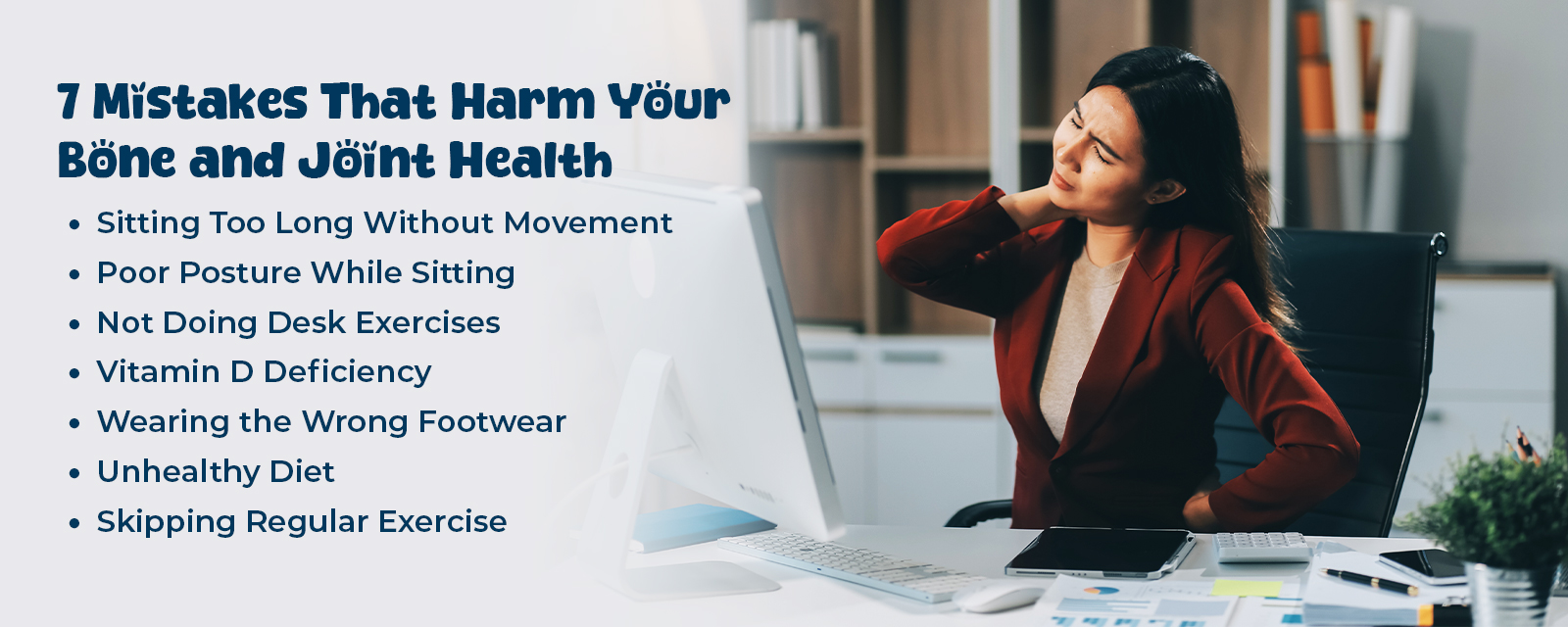Strong bone and joint health is a foundation of a happy and healthy life. Yet, many of us are unknowingly straining them every single day, with simple mistakes.
Desk jobs are causing poor posture, lack of sunlight, and sedentary routines silently weaken our musculoskeletal system.
But with simple desk job health tips, you can protect your joints, improve mobility for long-term knee health.
In this blog, we explore the 7 most common mistakes that harm bone and joint health and what you can do instead.
|
TABLE OF CONTENTS The Hidden Impact of Desk Jobs on Musculoskeletal Health 7 Mistakes That Harm Your Bone and Joint Health 2.1 Sitting Too Long Without Movement 2.2 Poor Posture While Sitting 2.3 Not Doing Desk Exercises 2.4 Vitamin D Deficiency 2.5 Wearing the Wrong Footwear 2.6 Unhealthy Diet Skipping Regular Exercise Practical Tips for Stronger Bones and Joints Conclusion |
The Hidden Impact of Desk Jobs on Musculoskeletal Health:
Modern corporate culture has given rise to endless hours of sitting at the desk, whether at the office or while working from home.
While it doesn’t feel harmless, prolonged sitting can cause reduced blood flow, stiffens joints, back pain from sitting in bad posture, and early-onset knee pain.
Orthopedics often highlight that young professionals are now experiencing desk job health issues, once seen only in older adults. Awareness is the first step toward prevention.
7 Mistakes That Harm Your Bone and Joint Health:

Sitting Too Long Without Movement:
Sitting long hours without moving can lead to joint stiffness and reduce flexibility in your muscles.
For healthy joints, make regular movement a part of your routine. Follow these desk job health tips:
- Stand up every hour
- Walk at least 50 steps
- Take a 5-minute break to stretch your muscles while sitting.
- Avoid lifts and use stairs every day.
These micro-movements prevent muscle tightness and keep your joints active.
Poor Posture While Sitting:
Poor posture, like slouching or leaning forward towards the screen, puts an enormous stress on your spine.
Ideally, your desk or workstation should be ergonomically set up - screen at eye level, elbows bent at 90 degrees, feet flat on the ground.
For optimum posture correction, stretch at least 7 times during an 8-hour workday to reset your posture.
Not Doing Desk Exercises:
Most corporate professionals are inactive for too long; their muscles tighten, and their circulation slows down.
Desk yoga, seated stretches, forward bends, spinal twists, and backbends are some exercises for healthy joints that not only improve blood flow but also prevent muscular tension.
If you do yoga, pilates, or stretching in the morning, that can also help you negate the negative effects of your day’s job.
Vitamin D Deficiency:
Most offices are built in enclosed offices or air-conditioned rooms with little sunlight exposure.
Without optimum sun exposure, this can lead to vitamin D deficiency, which weakens bones and affects mood.
Regular sunlight, vitamin D tests, and doctor-recommended supplements are essential for bone strength.
Read More: Tired or Moody? Unexpected Symptoms of Vitamin D Deficiency You Shouldn’t Ignore
Wearing the Wrong Footwear:
Corporate professionals often wear high heels and other poorly cushioned shoes that can misalign their posture and strain their knees and back.
Opt for supportive, cushioned, or orthopedically approved footwear with a wide toe box and comfortable design.
The right shoes can make a big difference to your joint health.
Unhealthy Diet:
Diet plays an important part in your overall health and can be a deciding factor in your joint health.
Having Protein-rich foods like soybean, tofu, paneer, lentils, and eggs, combined with bone-friendly snacks such as almonds, walnuts, flaxseeds, and sesame seeds, can help maintain strength.
Optimum calcium intake and vitamin D are non-negotiable for healthy joints.
Skipping Regular Exercise:
Exercise is medicine for your bones and joints.
Even with a busy schedule, aim for 25-30 minutes of workout every day - be it brisk walking, cycling, yoga, or strength training.
Regular movement builds bone density, strengthens muscles, and reduces stiffness.
Practical Tips for Stronger Bones and Joints:
Apart from these desk job health tips, you can also make simple changes in your lifestyle to support your bone and joint health.
- Set movement reminders on your phone or smartwatch.
- Invest in ergonomic furniture to support posture.
- Add calcium and vitamin D-rich foods to your daily meals.
- Stay hydrated, as water helps maintain cartilage health.
- Mix up workouts to keep bones and joints flexible.
Conclusion:
Your bones and knees support you silently, every day, but modern habits put them under unnecessary strain.
By avoiding these 7 mistakes and adopting simple lifestyle changes, you can stay pain-free, active, and strong for years to come.
Remember - prevention is always easier than treatment. Start small today, and your future self will thank you.
Explore More From Naturopedia
The Real Reason You Can’t Stay Awake After Eating
Cardiac Arrest or Heart Attack? Know the Warning Signs Before It’s Too Late
These Brain Exercises will Improve Memory, Creativity, and Cognition







